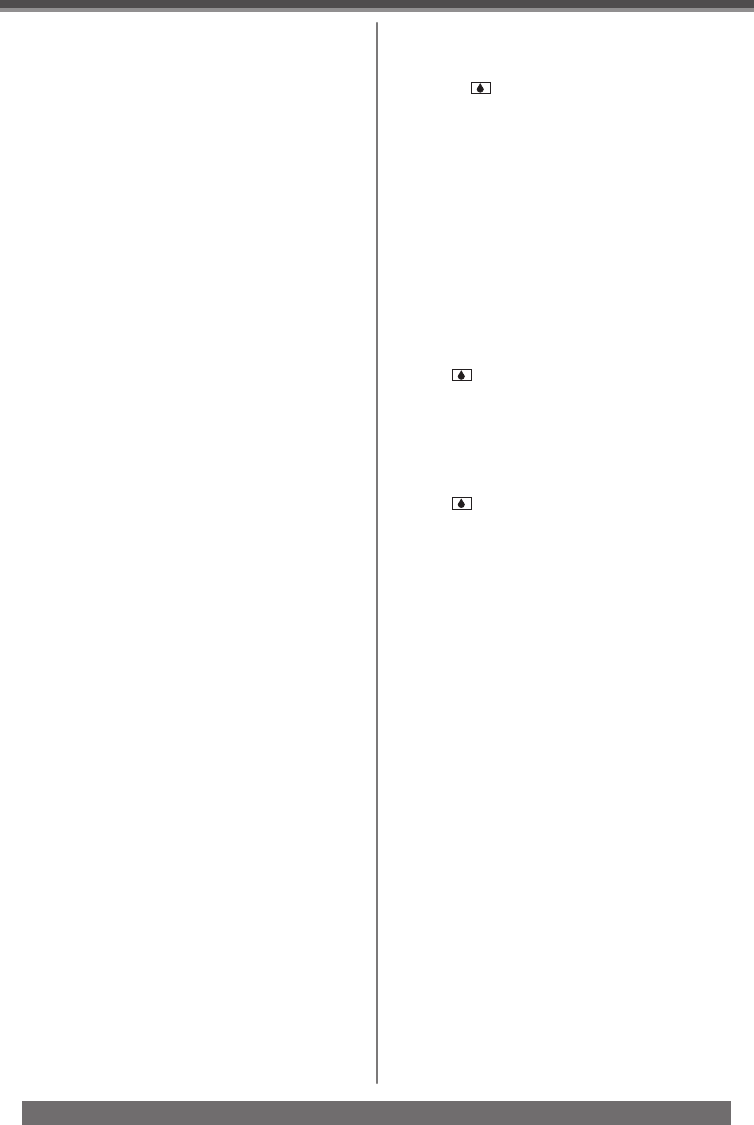
60
Others
For assistance, please call : 1-800-211-PANA(7262) or, contact us via the web at: http://www.panasonic.com/contactinfo
Condensation
If you turn the Camcorder on when condensation
occurs on the head or the tape, Condensation
Indication [ DEW ] (yellow or red) blinks on the
Viewfinder or the LCD Monitor and the messages
[DEW DETECTED] or [EJECT TAPE] (only when
the tape is inserted) appear. In this case, follow the
procedure below.
Blinking in yellow:
Dew is slightly adhering to the head or the tape.
Blinking in red:
Dew has adhered to the head or the tape.
1 Remove the tape if it is inserted.
• It takes about 20 seconds to open the Cassette
Holder. This is not a malfunction.
2 Leave the Camcorder with the Cassette
Compartment Cover closed to cool or warm
it to the ambient temperature.
When [ DEW ] blinks in yellow
• You cannot use the Tape Recording/Playback
Mode. Leave the Camcorder for about
30 minutes.
• However, you can use the Card Recording
Mode or Picture Playback Mode when the
cassette is not inserted.
When [ DEW ] blinks in red
• The Power Indicator Lamp blinks for about
1 minute and then the Camcorder automatically
turns off. Leave it for about 2 to 3 hours.
3 Turn the Camcorder on again, set it to
the Tape Recording/Playback Mode and
then check if the condensation indication
disappears.
Especially in cold conditions, dew may be frozen.
In this case, it may take more time before the
condensation indication disappears.
Watch for Condensation even before the
Condensation Indication is displayed.
• The condensation indication may not appear
depending on circumstances. When condensation
occurs on the lens or the Camcorder, it also may
occur on the head and the tape. Do not open the
Cassette Compartment Cover.
When the Lens Is Fogged:
Set the [OFF/ON] Switch to [OFF] and leave the
Camcorder in this condition for about 1 hour. When
the lens temperature becomes close to the ambient
temperature, the fog disappears naturally.
Video Head Clogging and Care
If the heads (the parts that make contact with the tape)
are dirty, mosaic-pattern noise may appear on the
playback image, or the screen as a whole becomes
black. If the heads are extremely dirty, recording
performance deteriorates, and, in the worst case, the
Camcorder cannot record at all.
When you use your Camcorder on a beach or
similar place, do not let sand or fine dust get
into the Camcorder.
• Sand or dust may damage the Camcorder or
Cassette. (Care should be taken when inserting and
removing the Cassette.)
Do not spray insecticides or volatile chemicals
onto the Camcorder.
• If the Camcorder is sprayed with such chemicals,
the camera body may be deformed and the surface
finish may peel off.
• Do not keep rubber or plastic products in contact
with the Camcorder for a long period of time.
Do not use benzine, thinner or alcohol for
cleaning the Camcorder.
• The Camcorder body may be deformed and the
surface finish may peel off.
• Before cleaning, detach the Battery or pull out the
AC Cable from the AC Jack.
• Wipe the Camcorder with a soft dry cloth. To remove
stubborn stains, wipe with a cloth that is soaked in
a detergent diluted with water and afterwards finish
wiping with a dry cloth.
• For storing or transporting the Camcorder, place it in
a bag or case lined with soft pads so as to prevent
the coating on the camera body from being worn.
After use, be sure to take the Cassette out and
detach the Battery from the Camcorder or pull
out the AC Cable from AC Jack.
• If the Cassette is left in the Camcorder, the tape
sags and deteriorates.
• If the Battery is left on the Camcorder for a long time,
the voltage drops excessively, and the Battery will
not function even after it is recharged.
About AC Adaptor
• If the temperature of the Battery is extremely high or
extremely low, the [CHARGE] Lamp may continue
flashing, and the Battery may not be charged. After
the temperature of the Battery has decreased or
increased sufficiently, charging starts automatically.
If the [CHARGE] Lamp continues to flash even after
the Battery temperature has decreased or increased
sufficiently, the Battery or AC Adaptor may be faulty.
In this case, please contact a dealer.
• If the Battery is warm, charging takes a longer time
than normal.
• If you use the AC Adaptor near a radio, radio
reception may be disturbed. Keep the AC Adaptor
3 feet (1 meter) or more away from radio.
• When using the AC Adaptor, it may generate
whirring sounds. However, this is normal.
• After use, be sure to pull out the AC Cable from
the AC Jack. (If they are left connected, a minute
amount of current is consumed.)
• Keep the electrodes of the AC Adaptor and Battery
always clean.


















